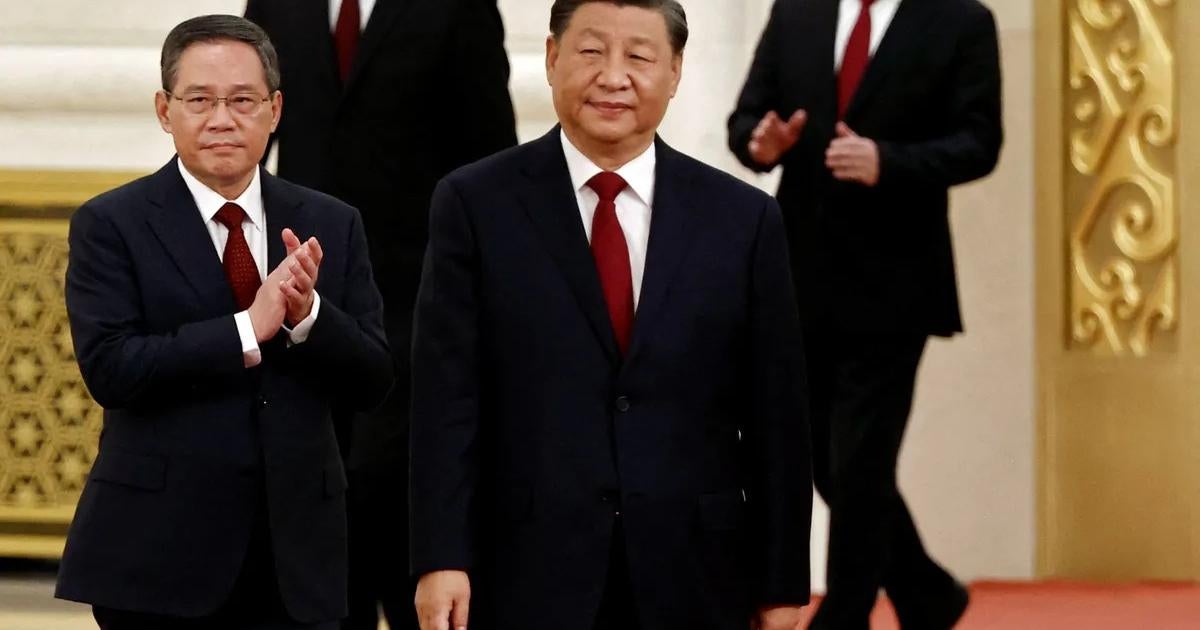Xi’s grip may have tightened, but he still has China’s long history of democratic protest to contend with

“Remove that authoritarian traitor Xi Jinping,” read the banner, handwritten in red and put up by a lone person on a Beijing bridge ahead of the first day of the Chinese Communist Party’s 20th national congress earlier this month. Images of the banner sent a jolt through China before intense censorship kicked in, with such direct criticism of the top leader seen as a rare display of courage in the face of certain punishment, ubiquitous surveillance and tight social control. As expected, the congressional event went ahead as planned and gave Mr. Xi an unprecedented third term as the party’s General Secretary.
The CCP would like us to think such acts of protest are rare in present-day China. In the 1990s and early 2000s, the Chinese government published statistics on the number of “mass incidents” of protest in the country, which ballooned from 8,700 in 1993 to over 87,000 in 2005.
The government stopped publishing official counts in 2005, but protests continued in China. Citizen journalists Lu Yuyu and Li Tingyu began documenting these incidents in 2012, from workers’ strikes to environmental demonstrations, and logged 28,950 such occurrences in 2015 alone. In 2016, both were detained for “creating disturbances.” People continue to thumb their noses at Mr. Xi and the CCP in the relative safety of virtual spaces beyond China’s Great Firewall.
The online subculture of rubao, which literally means “insulting the bun,” has Mr. Xi as its target and was named for his visit to a bun shop early in his tenure, a media-relations stunt that was meant to show he cared about the people. A wildly popular rubao social media account produces slick music videos mocking Mr. Xi, with its most popular post (counting 1.9 million views on YouTube) being a clever edit of the CCP leader’s gaffes set to music. A number of online forums, such as Pincong and the Reddit group China in Real Life (which has more than 140,000 users), are unapologetically critical of Mr. Xi. Many of these democracy supporters call themselves “the opposition bandits” (fanzei) – proudly reappropriating a derogatory term used to describe dissidents – and they fight online battles with those who hold pro-government views, whom they call the “Little Pinks” (xiaofenhong). Within the Great Firewall, where censorship is intense, fanzei also regularly engage in chongta – which means “push against the tower” – by posting oblique but critical comments and risking punishment from the Chinese government.
The comment sections of official state-media posts are popular chongta targets. Before Mr. Xi came to power in 2012 and tightened the screws on Chinese society, support for human rights and democracy was more mainstream, especially online. But even Mr. Xi has not been able to entirely quash China’s long tradition of democratic protest. For more than a century, China has journeyed along a lengthy and contentious road to freedom. My own great-grandfather was a farmer-revolutionary who followed Sun Yat-sen, who helped end China’s last dynasty in 1911 and is remembered for his vision of a modern democratic China.
The end of dynasticism in the country was followed by the May Fourth Movement of 1919, which advocated for the promotion of science and democracy. Before the CCP seized power in 1949, its leadership promised the people of China that democracy would take hold.
The world bore witness to the country’s pro-democracy protests of 1989, which were crushed by the Chinese government. This year’s lone bridge protester in Beijing bore a striking similarity to the iconic Tank Man, who stood alone in front of advancing artillery during the Tiananmen Square protests. In the early 2000s, when the internet first became widely accessible, there were fewer government controls and open criticism of the CCP led to growing waves of activism both online and off. In 2010, the imprisonment of three netizens in Fuzhou culminated in street protests in which hundreds of people chanted, “freedom of expression.” In 2013, the censorship of the outspoken newspaper Southern Weekly triggered protests in which hundreds gathered to call for press freedom. In 2018, a woman named Dong Yaoqiong livestreamed herself pouring ink on a Xi poster. In January of this year, a man unfurled a banner in Shenzhen calling for Mr. Xi to step down. To those who have struggled for democracy in China, Mr. Xi’s unprecedented third term is a bitter disappointment. But taking a much longer view, China has always had people who, with incredible courage, have strived to build a country that is fairer and more equal for more than a century. Mr. Xi will set back the clock, but the river of history will wash over him.
Read the full article at the original website
References:
- https://www.theguardian.com/world/2022/oct/14/we-all-saw-it-anti-xi-jinping-protest-electrifies-chinese-internet
- https://www.theglobeandmail.com/world/article-china-xi-jinping-communist-party-congress/
- https://can01.safelinks.protection.outlook.com/?url=https%3A%2F%2Fchina.usc.edu%2Flooking-protesting-china&data=05%7C01%7CKWilkinson%40globeandmail.com%7Cd9762bde51ac46961c9908dab68a7439%7C44376110425e46ab942e26c9518bfd03%7C1%7C0%7C638023003034562978%7CUnknown%7CTWFpbGZsb3d8eyJWIjoiMC4wLjAwMDAiLCJQIjoiV2luMzIiLCJBTiI6Ik1haWwiLCJXVCI6Mn0%3D%7C3000%7C%7C%7C&sdata=p8Ul%2B38aB4iaVwxlWJxPLUrbSUG7UuhcT%2FP2Hv%2Fbxfc%3D&reserved=0
- https://can01.safelinks.protection.outlook.com/?url=https%3A%2F%2Fwww.wsj.com%2Farticles%2Fa-dissident-escapes-xi-jinpings-china-and-a-life-made-up-of-lies-11665567002&data=05%7C01%7CKWilkinson%40globeandmail.com%7Cd9762bde51ac46961c9908dab68a7439%7C44376110425e46ab942e26c9518bfd03%7C1%7C0%7C638023003034562978%7CUnknown%7CTWFpbGZsb3d8eyJWIjoiMC4wLjAwMDAiLCJQIjoiV2luMzIiLCJBTiI6Ik1haWwiLCJXVCI6Mn0%3D%7C3000%7C%7C%7C&sdata=gi4PyIn9%2FJQ%2B9R42%2BYlEfGyZ5jyvKeHHqbslOcP8WvU%3D&reserved=0
- https://newsworthknowingcn.blogspot.com/2016/01/2015.html
- https://can01.safelinks.protection.outlook.com/?url=https%3A%2F%2Fhongkongfp.com%2F2017%2F12%2F31%2Fdont-call-xi-bun-chinese-netizens-jailed-chatroom-jokes%2F&data=05%7C01%7CKWilkinson%40globeandmail.com%7Cd9762bde51ac46961c9908dab68a7439%7C44376110425e46ab942e26c9518bfd03%7C1%7C0%7C638023003034562978%7CUnknown%7CTWFpbGZsb3d8eyJWIjoiMC4wLjAwMDAiLCJQIjoiV2luMzIiLCJBTiI6Ik1haWwiLCJXVCI6Mn0%3D%7C3000%7C%7C%7C&sdata=dF1Bx%2FqUOL3o3s1vzBpqyfseU%2F8ZtrPo6uEAxVbUlh0%3D&reserved=0
- https://can01.safelinks.protection.outlook.com/?url=https%3A%2F%2Fwww.youtube.com%2Fwatch%3Fv%3DFhXdLIBVCMQ&data=05%7C01%7CKWilkinson%40globeandmail.com%7Cd9762bde51ac46961c9908dab68a7439%7C44376110425e46ab942e26c9518bfd03%7C1%7C0%7C638023003034562978%7CUnknown%7CTWFpbGZsb3d8eyJWIjoiMC4wLjAwMDAiLCJQIjoiV2luMzIiLCJBTiI6Ik1haWwiLCJXVCI6Mn0%3D%7C3000%7C%7C%7C&sdata=c4LYizEmhVUh45qkRLSgYzayUIBEG%2BNxkRIne9jNA84%3D&reserved=0
- https://pincong.rocks/
- https://www.nytimes.com/2019/05/03/opinion/china-may-fourth-movement-protests-1919-wusi.html
- https://youtu.be/UhzQupQH01w
- https://www.theatlantic.com/international/archive/2013/01/a-press-renaissance-the-legacy-of-chinas-southern-weekend/267081/
- https://can01.safelinks.protection.outlook.com/?url=https%3A%2F%2Fhongkongfp.com%2F2020%2F12%2F02%2Fink-girl-who-defaced-xi-jinping-poster-reappears-says-she-cant-take-intense-surveillance%2F&data=05%7C01%7CKWilkinson%40globeandmail.com%7Cd9762bde51ac46961c9908dab68a7439%7C44376110425e46ab942e26c9518bfd03%7C1%7C0%7C638023003034562978%7CUnknown%7CTWFpbGZsb3d8eyJWIjoiMC4wLjAwMDAiLCJQIjoiV2luMzIiLCJBTiI6Ik1haWwiLCJXVCI6Mn0%3D%7C3000%7C%7C%7C&sdata=jOAMuF8us0eSeVtx9UTkbr5Mv7Dq0r%2FBQR%2BmCwEYN4U%3D&reserved=0
